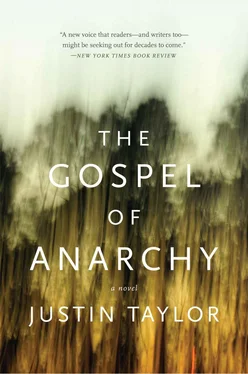“We don’t have seats,” he says, glumly. “We have a backyard with a fire pit and a tent.”
“Into dirt, then,” she says, smirking.
• • •
Here is a passage in which Parker considers three interrelated problems: those of subjectivity, doubt, and the physical body.
Can’t tell what is belief, or practice, and what is simply my own preference or character traits. I think of how Kierkegaard’s whole system is so clearly born of and shaped by his fundamental intolerance for the human. His abhorrence for the established church works as an argument for anarchist principles, and for the idea that the highest level of spiritual perfection is the standing-alone before God, but it seems like that vehemence also refracts backwards, shines on the physical body, as if in an attempt to burn it up. The body is the site of all experience in this world. It is through it that we know anything, everything, and certainly God. Why would God wish for us to hate that of which we are shaped, and through which we know the world He made? It doesn’t make sense at first. And yet, it begins to almost come together as I find that there is something ineluctably devastating in the idea of a body, the fact of it, that I am it and it is me, entirely, or stranger still the idea that it is not, and that something which is not this body but which “I” still know as “me” shall one day leave it behind. I hate to be this thing that spits and shits and grinds its teeth and yearns for a fuck. Is it possible that the abhorrence of the body is the path to finding comfort in becoming spirit, and is this what is meant by “salvation”? But why, then, if I was spirit before and shall be spirit again, should I suffer to be flesh now? There must be a reason that I cannot know, but the not-knowing feels like punishment, and this feeling fuels doubt and pain. Considering these questions drives me into a kind of impotent, childish rage; rage that I should have to wrestle with this question, despair at having to be anything at all. Are we not all crucified on the crosses of our bodies every moment of our breathing lives?
Katy, the sensualist, the inexhaustible, who so far as David can tell has never begrudged, questioned, or regretted either the fullness or the limits of her own physicality, finds this whole meditation off-putting and bleak. Parker must have been having a bad day when he wrote that, she says, because he wasn’t always like this — not even close . She laughs then in a way that alludes to experience, and David is forced to remember that she — unlike he — has actually known Parker (had she ever known Parker?) and he has not. His faith is belated! He’s come too late! But what had even Katy’s faith looked like before Parker’s departure? They had known he was special, but they hadn’t had ears yet to hear him or eyes to see. Their faith, in its fully realized form, had sprung up only after his leaving them, and so in a sense they are belated, too. They knew less, it seemed, for having known him, than he does, for having never. Blessed are they that have not seen, and yet have believed… That’s one of Katy’s favorite Bible verses. He understands now how it applies to her as well as to him. None of them has yet seen Parker and known him for who he is. When he returns to them, they will all greet him together, as if for the first time: face to face .
The body is the site of all experience in this world. It is through it that we know anything, everything, and certainly God. Why would God wish for us to hate that of which we are shaped, and through which we know the world He made?
“Doesn’t this get at the heart of it?” says Katy. “Isn’t this the crux of what he meant?”
It isn’t. At least David doesn’t think so. He thinks that she has edited an honest, earnest question into a rhetorical one that now seems to have been posed ironically, which it hadn’t been. She wants a book of aphorisms, it seems to him, might yet prefer a broadside. He tells her he is worried she is remaking Parker in her own image, that she is forging an idol in the fire — carving the easy prophecies that she wants out of the difficult gift they’ve been given.
She turns away from him, furious and hurt, not the den mother now, not the earth spirit or the sex priestess or the good-times punk. She is his lover, whom he has wounded, caught off guard and stung. He feels terrible and sick. He doesn’t know what time it is or what day. It’s dark out. He’s hungry, sober, and ticked off. The bedroom smells like old coffee; he’s grinding his teeth. When did they last eat? How long has it been like this, the two of them pitted head to head, huddled over the holy notebook, doing the most important work in the entire world, and how much are they willing to sacrifice to get it done? Are they going to blow apart, get sick of each other like Liz got sick of them?
He goes to hold her and she lets him.
They stay that way awhile, for however long.
Then they set to work again.
They bicker and make up, take ground and give it, read closely and argue over meaning and intent; whole days swallowed up, hands shrieking their way around a clock face.
Finally, they have a manuscript to give to Anchor. It’s a strange little chapbook, this Good Zine, uneven, a bizarre commingling of their counterpoised editorial philosophies, alternately wooing and repulsing its reader, here clear as a fortune cookie and there dense as stone, all the words Parker’s own as she wanted, save for the section headings, which he insisted upon including, and which they wrote together. The Zine is something that the whole house can take joy and delight in, and which they feel certain is destined to do its appointed Work.
ONLY EVER TO BE GIVEN AWAY FREELY:
THESE FRAGMENTS OF
THE GOSPEL OF ANARCHY
DELIVERED UNTO THE HOUSE OF FISHGUT
BY THE GRACE OF OUR LORD
AND HIS PROPHET PARKER WHO WROTE
THESE LINES AND MANY OTHERS
IN HIS OWN HAND
IN THE SUNSET OF THE MILLENNIUM
AND REVEALED THEM TO US
IN THE SUMMER OF ’99
Seven Theses of Anarchristianity
The Pattern is the breaking of the Pattern.
God frees and saves through the twin and inextricable gifts of Anarchy and Grace. We demonstrate our worthiness to receive these gifts by asserting that they are rightly ours.
When Christ spoke of the fulfillment of the Law, he spoke of the obliteration of the Law, because perfection means Stasis, which is Death. As the Christian triumphs over Death so the Anarchist over the Law — there is no difference or distinction between the obstacles, less still among those who triumph over them.
The body is the site of all experience in this world. It is through it that we know anything, everything, and certainly God. Why would God wish for us to hate that of which we are shaped, and through which we know the world He made?
Chaos is older than Creation. The Anarchist walks with God today, even as she hastens the Death of Empire, that all might walk with God tomorrow.
Joy is a better form of prayer than prayer, but prayer is also a better form of joy than joy.
Desire is a strange attractor. Your longing warps the arc of the world’s emergent truth.
A Grammar Lesson
What if instead of “no place,” utopia could be understood to mean “no place in particular”? As in, could be anywhere. As in, be here now . Beautiful, absurd things, possible only with God and through God, Who is the ultimate positive value, the universal affirmation that fills the freed space abandoned by the driven-out rulers of the fallen world, the demiurge and all his archons, their dead systems junk-heaped; their long shadows drowned in a lake of everlasting sun. Any place can be no place if you will it. You drive out everything that is not God, and what’s left is pure God, here and now. The eternal manifests in the temporal as a rupture, a revolutionary break. It is in this way that our faith makes us crazy in the world.
Читать дальше












